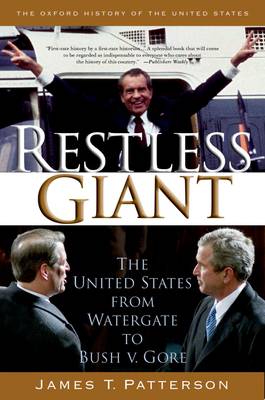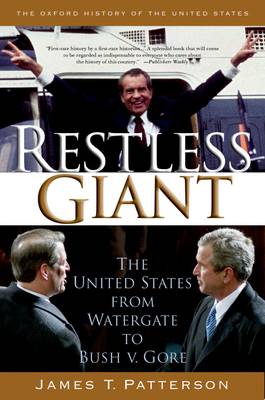
- Afhalen na 1 uur in een winkel met voorraad
- Gratis thuislevering in België vanaf € 30
- Ruim aanbod met 7 miljoen producten
- Afhalen na 1 uur in een winkel met voorraad
- Gratis thuislevering in België vanaf € 30
- Ruim aanbod met 7 miljoen producten
Zoeken
€ 29,45
+ 58 punten
Omschrijving
In Restless Giant, acclaimed historical author James Patterson provides a crisp, concise assessment of the twenty-seven years between the resignation of Richard Nixon and the election of George W. Bush in a sweeping narrative that seamlessly weaves together social, cultural, political, economic, and international developments. We meet the era's many memorable figures and explore the "culture wars" between liberals and conservatives that appeared to split the country in two. Patterson describes how America began facing bewildering developments in places such as Panama, Somalia, Bosnia, and Iraq, and discovered that it was far from easy to direct the outcome of global events, and at times even harder for political parties to reach a consensus over what attempts should be made. At the same time, domestic issues such as the persistence of racial tensions, high divorce rates, alarm over crime, and urban decay led many in the media to portray the era as one of decline. Patterson offers a more positive perspective, arguing that, despite our often unmet expectations, we were in many ways better off than we thought. By 2000, most Americans lived more comfortably than they had in the 1970s, and though bigotry and discrimination were far from extinct, a powerful rights consciousness insured that these were less pervasive in American life than at any time in the past. With insightful analyses and engaging prose, Restless Giant captures this period of American history in a way that no other book has, illuminating the road that the United States traveled from the dismal days of the mid-1970s through the hotly contested election of 2000. The Oxford History of the United States
The Oxford History of the United States is the most respected multi-volume history of our nation. The series includes three Pulitzer Prize winners, a New York Times bestseller, and winners of the Bancroft and Parkman Prizes. The Atlantic Monthly has praised it as "the most distinguished series in American historical scholarship," a series that "synthesizes a generation's worth of historical inquiry and knowledge into one literally state-of-the-art book." Conceived under the general editorship of C. Vann Woodward and Richard Hofstadter, and now under the editorship of David M. Kennedy, this renowned series blends social, political, economic, cultural, diplomatic, and military history into coherent and vividly written narrative.
The Oxford History of the United States is the most respected multi-volume history of our nation. The series includes three Pulitzer Prize winners, a New York Times bestseller, and winners of the Bancroft and Parkman Prizes. The Atlantic Monthly has praised it as "the most distinguished series in American historical scholarship," a series that "synthesizes a generation's worth of historical inquiry and knowledge into one literally state-of-the-art book." Conceived under the general editorship of C. Vann Woodward and Richard Hofstadter, and now under the editorship of David M. Kennedy, this renowned series blends social, political, economic, cultural, diplomatic, and military history into coherent and vividly written narrative.
Specificaties
Betrokkenen
- Auteur(s):
- Uitgeverij:
Inhoud
- Aantal bladzijden:
- 464
- Taal:
- Engels
- Reeks:
Eigenschappen
- Productcode (EAN):
- 9780195305227
- Verschijningsdatum:
- 5/03/2007
- Uitvoering:
- Paperback
- Formaat:
- Trade paperback (VS)
- Afmetingen:
- 155 mm x 231 mm
- Gewicht:
- 657 g

Alleen bij Standaard Boekhandel
+ 58 punten op je klantenkaart van Standaard Boekhandel
Beoordelingen
We publiceren alleen reviews die voldoen aan de voorwaarden voor reviews. Bekijk onze voorwaarden voor reviews.











